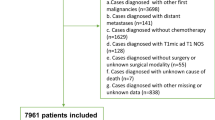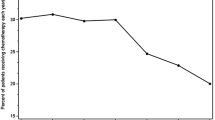Abstract
Background
The American Joint Committee on Cancer (AJCC) 8th edition pathologic prognostic staging (PPS) incorporates anatomic and biologic factors. The OncotypeDX Breast Recurrence Score (RS) was included based on the initial report of the TAILORx trial, with T1-2N0 hormone receptor-positive (HR+), human epidermal growth factor receptor 2-negative (HER2−) breast cancer patients who had a RS < 11 staged as PPS 1A. This study examined whether the RS criteria for PPS 1A can be further expanded using patients enrolled in the TAILORx trial.
Methods
The TAILORx trial enrolled 10,273 HR+HER2− T1-2N0 patients. Those with incomplete HR-status/grade and T3 disease were excluded for analysis. The recurrence-free interval (RFI) was compared between the patients who did and those who did not fall into the current PPS 1A category using the Kaplan-Meier method.
Results
The study enrolled 9535 patients for analysis. The RS was < 11 in 16.1%, 11–17 in 35.9%, 18–25 in 32.4%, and > 25 in 15.6% of the patients. The majority (91.2%) of the patients (including all the T1N0 patients regardless of RS) were PPS 1A, and 8.8% were not-PPS 1A. The median follow-up time was 95 months. The PPS 1A patients had an 8-year RFI of 94.2%, which was similar to that of the patients with a RS of 11–17 who were not-PPS 1A (91.7%; p = 0.07) and better than that of the patients with a RS ≥ 18 who were not-PPS 1A (85.4% for a RS of 18–25, 76.0% for a RS > 25; both p < 0.01). Similar RFI trends were seen in patients who received endocrine therapy or chemotherapy followed by endocrine therapy.
Conclusions
Patients with T1-2N0 HR+HER2− breast cancer and a RS < 18 have an RFI similar to that of patients staged as PPS 1A by the current AJCC staging system, regardless of treatment, suggesting that the criteria for PPS 1A can be expanded to include a RS < 18.



Similar content being viewed by others
References
American Joint Committee on Cancer. AJCC Cancer Staging Manual. 8th ed. Springer, 2017.
Giuliano AE, Edge SB, Hortobagyi GN. Eighth edition of the AJCC cancer staging manual: breast cancer. Ann Surg Oncol. 2018;25:1783–5. https://doi.org/10.1245/s10434-018-6486-6.
Weiss A, Chavez-MacGregor M, Lichtensztajn DY, et al. Validation study of the American Joint Committee on Cancer Eighth Edition prognostic stage compared with the anatomic stage in breast cancer. JAMA Oncol. 2018;4:203–09. https://doi.org/10.1001/jamaoncol.2017.4298.
Abdel-Rahman O. Assessment of the prognostic and discriminating value of the novel bioscore system for breast cancer; a SEER database analysis. Breast Cancer Res Treat. 2017;164:231–6. https://doi.org/10.1007/s10549-017-4244-2.
Plichta JK, Ren Y, Thomas SM, et al. Implications for breast cancer restaging based on the 8th-edition AJCC staging manual. Ann Surg. 2020;271:169–76. https://doi.org/10.1097/SLA.0000000000003071.
Wong RX, Wong FY, Lim J, Lian WX, Yap YS. Validation of the AJCC 8th prognostic system for breast cancer in an Asian healthcare setting. Breast. 2018;40:38–44. https://doi.org/10.1016/j.breast.2018.04.013.
Kim JY, Lim JE, Jung HH, et al. Validation of the new AJCC eighth edition of the TNM classification for breast cancer with a single-center breast cancer cohort. Breast Cancer Res Treat. 2018;171:737–45. https://doi.org/10.1007/s10549-018-4858-z.
Tokunaga E, Ijichi H, Tajiri W, et al. The comparison of the anatomic stage and pathological prognostic stage according to the AJCC 8th edition for the prognosis in Japanese breast cancer patients: data from a single institution. Breast Cancer. 2020;27:1137–46. https://doi.org/10.1007/s12282-020-01116-w.
Stemmer SM, Steiner M, Rizel S, et al. Ten-year clinical outcomes in N0 ER+ breast cancer patients with recurrence score-guided therapy. NPJ Breast Cancer. 2019;5:41. https://doi.org/10.1038/s41523-019-0137-3.
Mamounas EP, Liu Q, Paik S, et al. 21-Gene recurrence score and locoregional recurrence in node-positive/ER-positive breast cancer treated with chemo-endocrine therapy. J Natl Cancer Inst. 2017;109. https://doi.org/10.1093/jnci/djw259.
Nitz U, Gluz O, Christgen M, et al. Reducing chemotherapy use in clinically high-risk, genomically low-risk pN0 and pN1 early breast cancer patients: five-year data from the prospective, randomised phase 3 West German Study Group (WSG) PlanB trial. Breast Cancer Res Treat. 2017;165:573–83. https://doi.org/10.1007/s10549-017-4358-6.
Sparano JA, Gray RJ, Makower DF, et al. Adjuvant chemotherapy guided by a 21-gene expression assay in breast cancer. N Engl J Med. 2018;379:111–21. https://doi.org/10.1056/NEJMoa1804710.
Cardoso F, van’t Veer LJ, Bogaerts J, et al. 70-Gene signature as an aid to treatment decisions in early-stage breast cancer. N Engl J Med. 2016;375:717–29. Doi:https://doi.org/10.1056/NEJMoa1602253.
Kalinsky K, Barlow WE, Gralow JR, et al. 21-Gene assay to inform chemotherapy benefit in node-positive breast cancer. N Engl J Med. 2021;385:2336–47. https://doi.org/10.1056/NEJMoa2108873.
Sparano JA, Gray RJ, Makower DF, et al. Prospective validation of a 21-gene expression assay in breast cancer. N Engl J Med. 2015;373:2005–14. https://doi.org/10.1056/NEJMoa1510764.
Kantor O, King TA, Shak S, et al. Expanding criteria for prognostic stage 1A in hormone receptor-positive breast cancer. J Natl Cancer Inst. 2021;113:1744–50. https://doi.org/10.1093/jnci/djab095.
Mittendorf EA, Chavez-MacGregor M, Vila J, et al. Bioscore: a staging system for breast cancer patients that reflects the prognostic significance of underlying tumor biology. Ann Surg Oncol. 2017;24:3502–9. https://doi.org/10.1245/s10434-017-6009-x.
Chavez-MacGregor M, Mittendorf EA, Clarke CA, Lichtensztajn DY, Hunt KK, Giordano SH. Incorporating tumor characteristics to the American Joint Committee on Cancer Breast Cancer Staging System. Oncologist. 2017;22:1292–300. https://doi.org/10.1634/theoncologist.2017-0116.
Weiss A, King TA, Hunt KK, Mittendorf EA. Incorporating biologic factors into the American Joint Committee on Cancer Breast Cancer Staging System: review of the supporting evidence. Surg Clin North Am. 2018;98:687–702. https://doi.org/10.1016/j.suc.2018.03.005.
Kantor O, Niu J, Zhao H, et al. Comparative analysis of proposed strategies for incorporating biologic factors into breast cancer staging. Ann Surg Oncol. 2020;27:2229–37. https://doi.org/10.1245/s10434-019-08169-y.
Howlader N, Cronin KA, Kurian AW, Andridge R. Differences in breast cancer survival by molecular subtypes in the United States. Cancer Epidemiol Biomarkers Prev. 2018;27:619–26. https://doi.org/10.1158/1055-9965.EPI-17-0627.
Voduc KD, Cheang MC, Tyldesley S, Gelmon K, Nielsen TO, Kennecke H. Breast cancer subtypes and the risk of local and regional relapse. J Clin Oncol. 2010;28:1684–91. https://doi.org/10.1200/JCO.2009.24.9284.
Yoon EC, Schwartz C, Brogi E, Ventura K, Wen H, Darvishian F. Impact of biomarkers and genetic profiling on breast cancer prognostication: a comparative analysis of the 8th edition of breast cancer staging system. Breast J. 2019;25:829–37. https://doi.org/10.1111/tbj.13352.
Acknowledgment
The manuscript was prepared using data from Dataset NCT00310180-D1 from the NCTN/NCORP Data Archive of the National Cancer Institute’s (NCI’s) National Clinical Trials Network (NCTN). Data were originally collected from clinical trial NCT number 00310180 Program for the Assessment of Clinical Cancer Tests (PACCT-1): Trial Assigning Individualized Options for Treatment (TAILORx) Trial. All analyses and conclusions in this manuscript are the sole responsibility of the authors and do not necessarily reflect the opinions or views of the clinical trial investigators, the NCTN, the NCORP, or the NCI. The TAILORx clinical trial data are available by request through the NCTN data archive. Elizabeth A. Mittendorf receives support as the Rob and Karen Hale Distinguished Chair in Surgical Oncology. The funders had no role in study design, data collection and analysis, decision to publish, or preparation of the manuscript.
Author information
Authors and Affiliations
Corresponding author
Ethics declarations
Disclosure
Elizabeth A. Mittendorf reports compensated service on scientific advisory boards for AstraZeneca, Exact Sciences, Merck, and Roche/Genentech; uncompensated service on steering committees for Bristol Myers Squibb, Lilly, and Roche/Genentech; and institutional research support from Roche/Genentech (via SU2C grant) and Gilead. She reports the following nonfinancial interests and nonremunerated activities: Board of Directors for the American Society of Clinical Oncology and Scientific Advisor for Susan G. Komen for the Cure Foundation. Tari A. King reports speaker’s honoraria and compensated service on the scientific Advisory Board of Exact Sciences (formerly Genomic Health, Inc.) and compensated service for a Global Advisory Board of Besins Healthcare. Christy A. Russell and Steven Shak report employment by Exact Sciences (formerly Genomic Health, Inc.) and stock ownership of Exact Sciences. Eric P. Winer reports institutional research funding from Genentech/Roche; serving as a consultant for Athenex, Carrick Therapeutics, G1 Therapeutics, Genentech/Roche, Genomic Health, Gilead, GlaxoSmithKline, GSK, Jounce, Lilly, St. Lucia, Syros, and Zymeworks; a non-paid scientific advisory board membership at Leap Therapeutics; and serving as President-Elect of ASCO. The remaining authors have no conflicts of interest.
Additional information
Publisher's Note
Springer Nature remains neutral with regard to jurisdictional claims in published maps and institutional affiliations.
Rights and permissions
About this article
Cite this article
Kantor, O., Burstein, H.J., King, T.A. et al. Expanding the Staging Criteria for T1-2N0 Hormone-Receptor Positive Breast Cancer Patients Enrolled in TAILORx. Ann Surg Oncol 29, 8016–8023 (2022). https://doi.org/10.1245/s10434-022-12225-5
Received:
Accepted:
Published:
Issue Date:
DOI: https://doi.org/10.1245/s10434-022-12225-5




